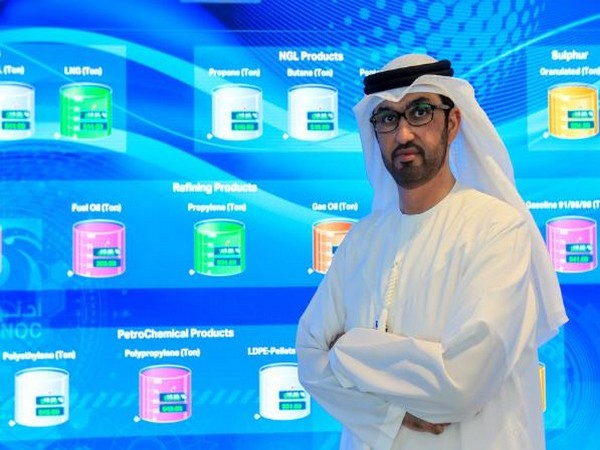Dubai [UAE], April 22: Minister of Industry and Advanced Technology and COP28 President Dr. Sultan Al Jaber was recognised with an award by the World Energy Council for his leadership in advancing the energy transition through the delivery of the historic UAE Consensus.
Dr. Al Jaber received the ‘Global Energy Transition Impact Award’- one of four inaugural World Energy Leadership Awards – at the Council’s Centennial Dinner, ahead of today’s World Energy Congress. The award was given in honour of his work on the UAE Consensus and for launching Net Zero energy transition alliances across multiple energy sectors.
The award is “really a recognition of the vision and commitment of the UAE’s leadership” in promoting a responsible energy transition, the President said in his acceptance speech. “They rallied the world around climate change, and they were instrumental in achieving the UAE Consensus,” he said.
“We are delighted to bestow the inaugural Global Energy Transition Impact Award to Dr. Sultan Ahmed Al Jaber for achieving a historic COP28 agreement known as the UAE Consensus and for the added achievements of launching Net Zero energy transition alliances involving multiple energy sectors,” said Dr. Angela Wilkinson, Secretary-General and CEO of the World Energy Council, who presented the award to Dr. Al Jaber.
She added, “His personal commitment and persistence have set a new direction in world energy towards accelerating decarbonisation with justice and resilience, leaving a lasting and positive impact on both society and the environment.”
Since COP28, the UAE Consensus has emerged as the defining point of reference for global climate action, giving clear direction to countries on how to keep 1.5°C within reach, while transforming agreements into tangible outcomes and ensuring global implementation.
The groundbreaking agreement was “a truly historic moment for climate diplomacy,” Dr. Al Jaber told delegates, delivering a series of “firsts” – including a commitment from all Parties to transition away from fossil fuels in energy systems, in a just, orderly and equitable manner, time-bound targets to triple global renewable energy capacity, and being the first COP to proactively engage industry, particularly the oil and gas sector.
At a time of geopolitical tension, “COP28 set a new standard for inclusivity,” the President said. “We moved the world beyond self-interest for the common good and we set clear direction, guided by science, for keeping our North Star of 1.5°C within reach. We now need to show that same solidarity in turning an unprecedented agreement into unprecedented action.”
With this year’s Congress marking 100 years since the first World Energy event, Dr. Al Jaber highlighted how the global energy mix has already seen considerable change, with wind and solar energy seeing an eight-fold expansion.
“The UAE has been at the forefront of this growth,” said Al Jaber. “In fact, if you sail from here into the North Sea, you will meet a white wall of windmills that the UAE, through Masdar, has invested in. Projects like the London Array, Dudgeon, Dogger Bank and Baltic Eagle are helping make Europe a world leader in wind power.”
Even so, hydrocarbons still represent 80 percent of today’s energy mix, he pointed out, and with energy demand set to grow by almost a quarter in the next two decades, the world will need to replace the daily equivalent of over 270 million barrels of oil, gas and coal.
“This is a massive political, social, economic, technological and engineering challenges at the same time,” Dr. Al Jaber said. “And every stakeholder has a critical role to play.”
The President reiterated calls for countries to adopt comprehensive, economy-wide emission-reduction targets in their upcoming Nationally Determined Contributions (NDCs), and for industries to collaborate on decarbonising both the demand and supply side of the current energy system.
“Tripling renewable energy capacity is just the beginning,” Dr. Al Jaber noted. “We also need to expand nuclear, hydrogen, geothermal and other zero-carbon energies yet to be discovered or deployed.”
The President also highlighted the need to maximise efficiency across the energy value chain, saying that adopting emerging technologies – especially artificial intelligence – will “make a game-changing difference.”
Dr. Al Jaber called for an “integrated approach” to the energy transition, connecting “the biggest industrial consumers with the biggest producers, technology companies, the financial community, civil society and policymakers,” he said.
“COP28 was a turning point in history,” Dr. Al Jaber said. “It was the moment that the world got serious about the energy transition and got real about what the transition will actually take.”
The energy transition will “take time, it will happen in different places at different paces” he said, “and we cannot simply unplug the current energy system before the new one is built.”
“That said, if we make the right investments, we can launch new industries, new jobs and a new low carbon economic pathway,” the President said in his concluding remarks, calling on “all stakeholders, government, private and civil society to unite around action that delivers real results. Action that follows the science to keep 1.5°C within reach. And action that advances human progress.”
Home Featured Stories COP28 President receives inaugural ‘Global Energy Transition Impact Award’ from World Energy...

































